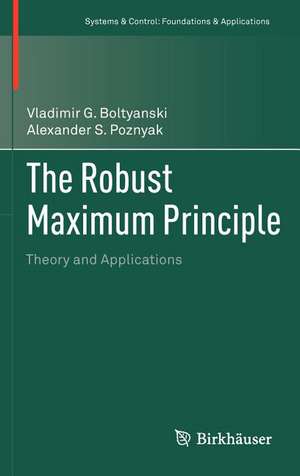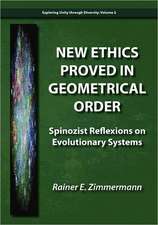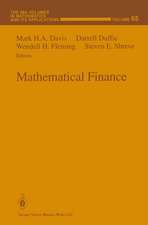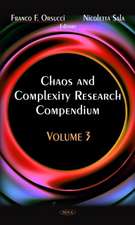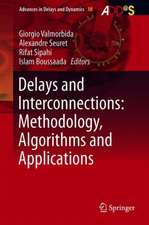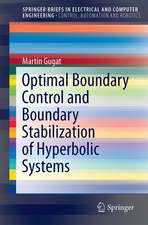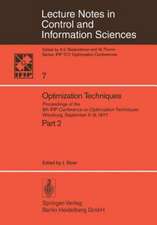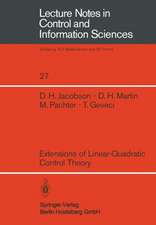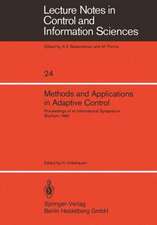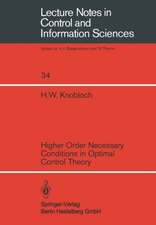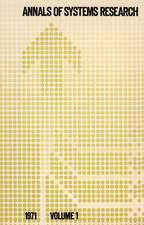The Robust Maximum Principle: Theory and Applications: Systems & Control: Foundations & Applications
Autor Vladimir G. Boltyanski, Alexander S. Poznyaken Limba Engleză Hardback – 5 noi 2011
The text begins with a standalone section that reviews classical optimal control theory. Moving on to examine the tent method in detail, the book then presents its core material, which is a more robust maximum principle for both deterministic and stochastic systems. The results obtained have applications in production planning, reinsurance-dividend management, multi-model sliding mode control, and multi-model differential games.
Using powerful new tools in optimal control theory, this book explores material that will be of great interest to post-graduate students, researchers, and practitioners in applied mathematics and engineering, particularly in the area of systems and control.
Din seria Systems & Control: Foundations & Applications
- 18%
 Preț: 1050.35 lei
Preț: 1050.35 lei - 17%
 Preț: 490.57 lei
Preț: 490.57 lei - 15%
 Preț: 654.95 lei
Preț: 654.95 lei - 15%
 Preț: 654.43 lei
Preț: 654.43 lei - 15%
 Preț: 641.85 lei
Preț: 641.85 lei -
 Preț: 404.51 lei
Preț: 404.51 lei -
 Preț: 400.10 lei
Preț: 400.10 lei -
 Preț: 394.51 lei
Preț: 394.51 lei - 15%
 Preț: 640.37 lei
Preț: 640.37 lei - 15%
 Preț: 635.80 lei
Preț: 635.80 lei - 15%
 Preț: 646.11 lei
Preț: 646.11 lei -
 Preț: 382.36 lei
Preț: 382.36 lei -
 Preț: 386.39 lei
Preț: 386.39 lei - 18%
 Preț: 946.24 lei
Preț: 946.24 lei - 18%
 Preț: 1395.94 lei
Preț: 1395.94 lei - 18%
 Preț: 961.10 lei
Preț: 961.10 lei - 18%
 Preț: 968.19 lei
Preț: 968.19 lei -
 Preț: 388.34 lei
Preț: 388.34 lei - 15%
 Preț: 645.47 lei
Preț: 645.47 lei -
 Preț: 404.13 lei
Preț: 404.13 lei - 18%
 Preț: 965.02 lei
Preț: 965.02 lei - 15%
 Preț: 649.87 lei
Preț: 649.87 lei - 18%
 Preț: 974.98 lei
Preț: 974.98 lei -
 Preț: 386.00 lei
Preț: 386.00 lei -
 Preț: 393.52 lei
Preț: 393.52 lei - 15%
 Preț: 642.68 lei
Preț: 642.68 lei -
 Preț: 390.84 lei
Preț: 390.84 lei -
 Preț: 388.72 lei
Preț: 388.72 lei - 15%
 Preț: 655.45 lei
Preț: 655.45 lei - 20%
 Preț: 1003.63 lei
Preț: 1003.63 lei - 15%
 Preț: 648.89 lei
Preț: 648.89 lei - 15%
 Preț: 645.47 lei
Preț: 645.47 lei -
 Preț: 386.00 lei
Preț: 386.00 lei - 18%
 Preț: 952.89 lei
Preț: 952.89 lei -
 Preț: 396.40 lei
Preț: 396.40 lei - 15%
 Preț: 642.68 lei
Preț: 642.68 lei - 15%
 Preț: 650.19 lei
Preț: 650.19 lei
Preț: 790.28 lei
Preț vechi: 963.76 lei
-18% Nou
Puncte Express: 1185
Preț estimativ în valută:
151.24€ • 164.22$ • 127.04£
151.24€ • 164.22$ • 127.04£
Carte tipărită la comandă
Livrare economică 22 aprilie-06 mai
Preluare comenzi: 021 569.72.76
Specificații
ISBN-13: 9780817681517
ISBN-10: 0817681515
Pagini: 432
Ilustrații: XXII, 432 p. 36 illus.
Dimensiuni: 155 x 235 x 28 mm
Greutate: 0.68 kg
Ediția:2012
Editura: Birkhäuser Boston
Colecția Birkhäuser
Seria Systems & Control: Foundations & Applications
Locul publicării:Boston, MA, United States
ISBN-10: 0817681515
Pagini: 432
Ilustrații: XXII, 432 p. 36 illus.
Dimensiuni: 155 x 235 x 28 mm
Greutate: 0.68 kg
Ediția:2012
Editura: Birkhäuser Boston
Colecția Birkhäuser
Seria Systems & Control: Foundations & Applications
Locul publicării:Boston, MA, United States
Public țintă
ResearchCuprins
Preface.- Introduction.- I Topics of Classical Optimal Control.- 1 Maximum Principle.- 2 Dynamic Programming.- 3 Linear Quadratic Optimal Control.- 4 Time-Optimization Problem.- II Tent Method.- 5 Tent Method in Finite Dimensional Spaces.- 6 Extrenal Problems in Banach Space.- III Robust Maximum Principle for Deterministic Systems.- 7 Finite Collection of Dynamic Systems.- 8 Multi-Model Bolza and LQ-Problem.- 9 Linear Multi-Model Time-Optimization.- 10 A Measured Space as Uncertainty Set.- 11 Dynamic Programming for Robust Optimization.- 12 Min-Max Sliding Mode Control.- 13 Multimodel Differential Games.- IV Robust Maximum Principle for Stochastic Systems.- 14 Multi-Plant Robust Control.- 15 LQ-Stochastic Multi-Model Control.- 16 A Compact as Uncertainty Set.- References.- Index.
Recenzii
From the reviews:
“This book is a useful and positive contribution to the literature of optimal control theory. … The book covers a rather expansive collection of topics, individual topics are usually well motivated, and most chapters have concluding and, on occasion, historical remarks to provide useful perspective to the reader. … more suitable as a reference for researchers … .” (Kevin A. Grasse, Mathematical Reviews, September, 2013)
“This good structured and really clearly written book is worth reading both for readers interested in theory and applications of optimal control. For theory, since robustness embraces dependencies and sensitivities with respect to deterministic or stochastic uncertainties, and for applications, since robustness of a method is responsible for a good use of numerical results. … The special technique specific for stochastic calculus is fully used in the last section of the book and supports the recommendation that it is a pleasure to read this book.” (Alfred Göpfert, Zentralblatt MATH, Vol. 1239, 2012)
“This book is a useful and positive contribution to the literature of optimal control theory. … The book covers a rather expansive collection of topics, individual topics are usually well motivated, and most chapters have concluding and, on occasion, historical remarks to provide useful perspective to the reader. … more suitable as a reference for researchers … .” (Kevin A. Grasse, Mathematical Reviews, September, 2013)
“This good structured and really clearly written book is worth reading both for readers interested in theory and applications of optimal control. For theory, since robustness embraces dependencies and sensitivities with respect to deterministic or stochastic uncertainties, and for applications, since robustness of a method is responsible for a good use of numerical results. … The special technique specific for stochastic calculus is fully used in the last section of the book and supports the recommendation that it is a pleasure to read this book.” (Alfred Göpfert, Zentralblatt MATH, Vol. 1239, 2012)
Textul de pe ultima copertă
Both refining and extending previous publications by the authors, the material in this monograph has been class-tested in mathematical institutions throughout the world. Covering some of the key areas of optimal control theory (OCT)—a rapidly expanding field that has developed to analyze the optimal behavior of a constrained process over time—the authors use new methods to set out a version of OCT’s more refined ‘maximum principle’ designed to solve the problem of constructing optimal control strategies for uncertain systems where some parameters are unknown. Referred to as a ‘min-max’ problem, this type of difficulty occurs frequently when dealing with finite uncertain sets.
The text begins with a standalone section that reviews classical optimal control theory, covering the principal topics of the maximum principle and dynamic programming and considering the important sub-problems of linear quadratic optimal control and time optimization. Moving on to examine the tent method in detail, the book then presents its core material, which is a more robust maximum principle for both deterministic and stochastic systems. The results obtained have applications in production planning, reinsurance-dividend management, multi-model sliding mode control, and multi-model differential games.
Key features and topics include:
* A version of the tent method in Banach spaces
* How to apply the tent method to a generalization of the Kuhn-Tucker Theorem as well as the Lagrange Principle for infinite-dimensional spaces
* A detailed consideration of the min-max linear quadratic (LQ) control problem
* The application of obtained results from dynamic programming derivations to multi-model sliding mode control and multi-model differential games
* Two examples, dealing with production planning and reinsurance-dividend management, that illustrate the use of the robust maximum principle in stochastic systems
Usingpowerful new tools in optimal control theory, The Robust Maximum Principle explores material that will be of great interest to post-graduate students, researchers, and practitioners in applied mathematics and engineering, particularly in the area of systems and control.
The text begins with a standalone section that reviews classical optimal control theory, covering the principal topics of the maximum principle and dynamic programming and considering the important sub-problems of linear quadratic optimal control and time optimization. Moving on to examine the tent method in detail, the book then presents its core material, which is a more robust maximum principle for both deterministic and stochastic systems. The results obtained have applications in production planning, reinsurance-dividend management, multi-model sliding mode control, and multi-model differential games.
Key features and topics include:
* A version of the tent method in Banach spaces
* How to apply the tent method to a generalization of the Kuhn-Tucker Theorem as well as the Lagrange Principle for infinite-dimensional spaces
* A detailed consideration of the min-max linear quadratic (LQ) control problem
* The application of obtained results from dynamic programming derivations to multi-model sliding mode control and multi-model differential games
* Two examples, dealing with production planning and reinsurance-dividend management, that illustrate the use of the robust maximum principle in stochastic systems
Usingpowerful new tools in optimal control theory, The Robust Maximum Principle explores material that will be of great interest to post-graduate students, researchers, and practitioners in applied mathematics and engineering, particularly in the area of systems and control.
Caracteristici
Class-tested in mathematical institutions throughout the world Includes a stand-alone review of classical optimal control theory Presents a new version of the maximum principle for the construction of optimal control strategies for the class of uncertain systems given by a system of ordinary differential equations with unknown parameters from a given set that corresponds to different scenarios of possible dynamics Real-world applications to areas such as production planning and reinsurance-dividend management Applications of obtained results from dynamic programming derivations to multi-model sliding mode control and multi-model differential games Includes supplementary material: sn.pub/extras
